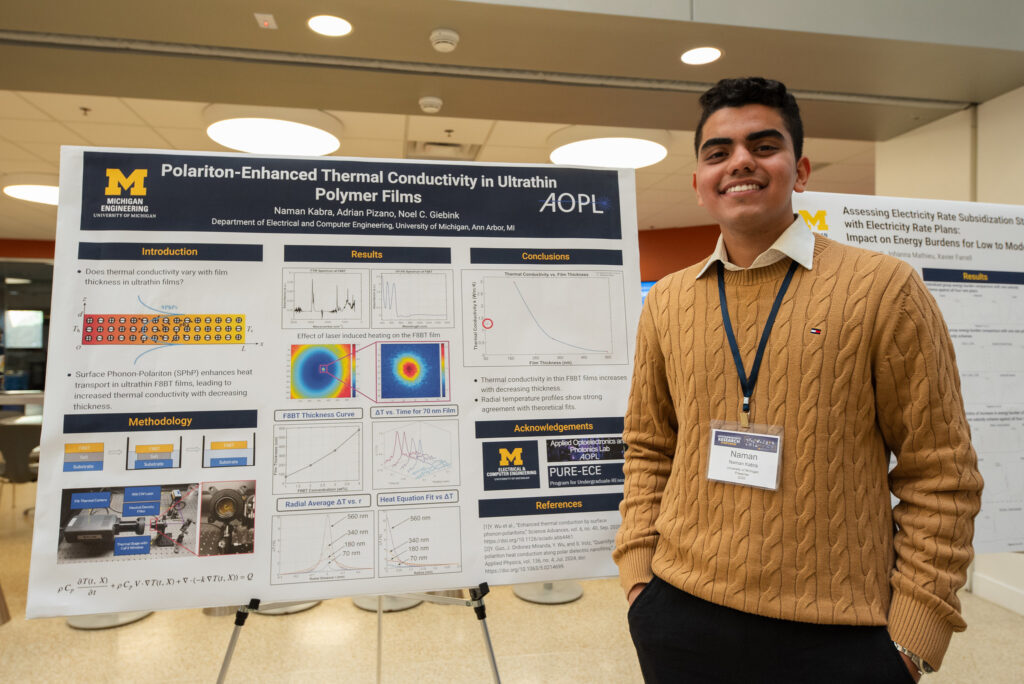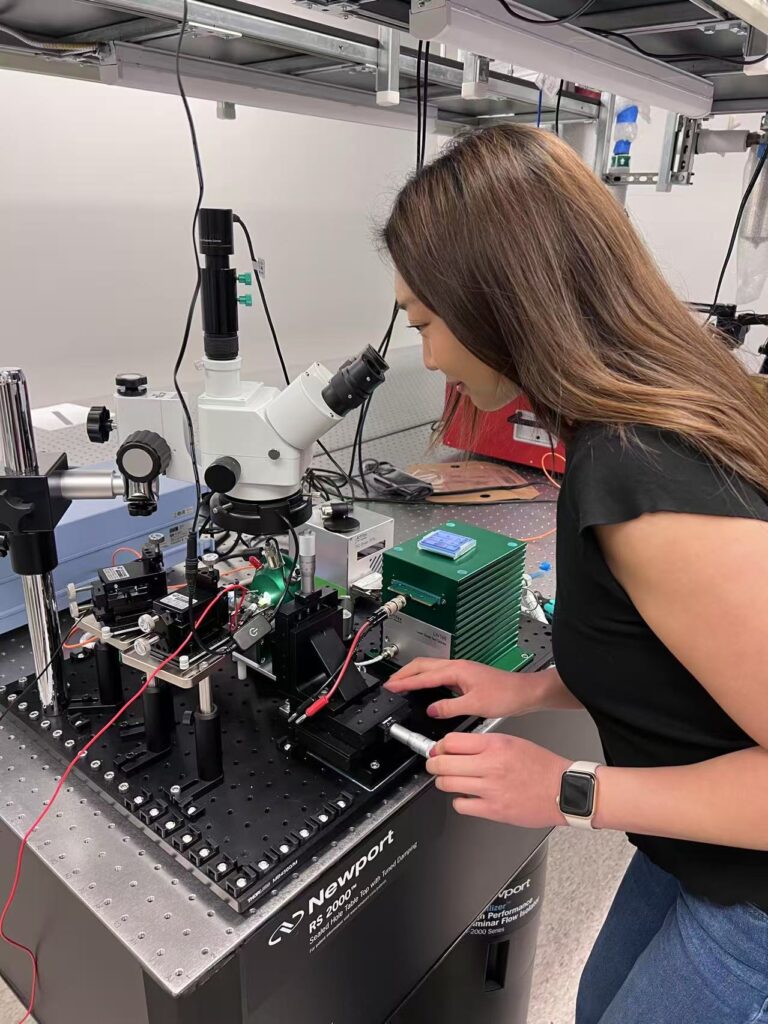PURE-ECE takes off with successful pilot year, showcased at Undergraduate Research Symposium
What is the best way to label objects for lidar detection? How can you tell if a neural network is working without ground truth information? What can engineering educators do to improve classroom experiences for students with ADHD?
Mingling with peers and faculty in the EECS building atrium on April 23, participants in the inaugural Program for Undergraduate REsearch–Electrical and Computer Engineering (PURE-ECE) answered these questions and many more at the first annual Undergraduate Research Symposium.

PURE-ECE gives sophomores and juniors in computer engineering or electrical engineering an opportunity to get involved in undergraduate research with a faculty mentor for a full academic year.
“The idea for PURE-ECE arose from a conversation I had with one of our outstanding undergraduates in the department,” said Dennis Sylvester, who was interim chair of ECE at the time of PURE-ECE’s conception. “We identified a need for more in-depth research opportunities at the late undergraduate stage, and I conceived of a program that spanned a full academic year to really allow a faculty and student to have a meaningful experience. The staff moved quickly to launch the pilot year, and Jeff Fessler chose a great name!”
The first year of PURE-ECE was supported by a generous donation from alum and ECE Council member RJ Jain (BSE CE 2009).
“Research can impact billions of people’s lives,” said Jain. “Advancing research is the fastest and best way to have a positive impact on people’s lives.”
It’s also great for the students.
“PURE-ECE greatly enhances the competitiveness of our undergraduates, whether they will pursue graduate studies or enter the job market,” said Prof. Di Liang. “It helps them explore their interests and identify their strengths. I also find myself learning a great deal from these bright young minds.”
A variety of student projects
In the PURE-ECE program, faculty advertise their projects and are matched with interested students. Students are expected to spend eight hours per week on the projects over the fall and winter terms, earning four credits towards their program in the process. The projects could be ideas that faculty are curious about but haven’t had time to pursue, bite-sized pieces of existing graduate student projects, or new questions that the students and faculty develop collaboratively. The following three projects are a sample of research topics spanning the broad scope of ECE at Michigan.
Designing materials to prevent devices from overheating
“My research is like trying to build a hidden highway for heat,” said Naman Kabra, junior in electrical engineering. “It could potentially make future devices cooler, literally and figuratively.”
Kabra spent the academic year working with Prof. Chris Giebink and PhD student Adrian Pizano on the project “Polariton-enhanced thermal conductivity in ultrathin polymer films.” He fabricated and tested thin, flexible materials used in applications like OLED screens, wearable devices, and solar cells. The team was interested in understanding how the interaction of light and vibration at the surface of these materials may help heat disburse and act as a natural cooling mechanism.

“Most of the strategies for cooling electronics rely heavily on adding material layers that spread heat or on passive cooling methods, which add bulk. Flexible and wearable devices don’t have the luxury to take on extra bulk or layers—they’re thin, soft, and delicate,” explained Kabra. “If we can understand and harness this natural light-driven mechanism within the film itself, we can redesign the way we manage heat on a nanoscale. It’s a shift from adding thermal solutions to engineering them directly into the material structure.”
Kabra was interested in Giebink’s project because of his experience with the solar car team. PURE-ECE helped Kabra bridge the gap between his classes and real-world applications. Kabra said Giebink and Pizano encouraged him to be persistent, ask better questions, and always be curious.

Improving the educational experience for students with ADHD
Musabbiha Zaheer, junior in computer engineering, worked with Prof. Cindy Finelli on a project entitled “Impact of instructional practices on the sense of belonging of engineering college students with ADHD.”
For this project, Zaheer joined an existing Finelli Lab project, originally started by alum Laura Carroll during her PhD and supported by NSF. Zaheer was involved in focus group and individual interviews of engineering college students diagnosed with ADHD, to learn about their educational experiences.
“The outcomes of this project are going to be helpful and make learning easier for many students with ADHD. It’s going to build a more inclusive classroom—and that’s just better for everyone,” said Zaheer.
Zaheer has been working with the Finelli Lab as an hourly research assistant since 2023, but PURE-ECE gave her the opportunity to have deeper involvement and ownership in a project.
It also gave her experiences that have broadened her outlook, including helping write conference papers, and even presenting at a symposium.
“When I came to Michigan,” said Zaheer, “I originally thought I’d get my bachelor’s and go directly into industry. But now it feels like I have more options. Maybe I could do a master’s. Maybe I could do research as a career.”
Optimizing the efficiency of data allocation
Priam Alataris, junior in electrical engineering, worked on a project, entitled “A system implementation of learning-based resource allocation algorithms for edge networks,” with Prof. Lei Ying.
Alataris implemented and tested an algorithm to efficiently allocate data to different resource blocks in a way that minimizes communication and computing times. He worked in a program called GNU Radio and used Python to code his prototype, applying some of his knowledge from his coursework.

“This was a really good opportunity for me to get into a research area that I had no prior experience with,” said Alataris. “I got really lucky—Professor Ying is very supportive and he understands that as an undergrad I need some help sometimes. I think this has been a really good stepping stone for me to prepare for graduate studies.”
Alataris will be continuing his research with Lei Ying this summer as part of the Summer Undergraduate Research in Engineering (SURE) program. He has explored entrepreneurial opportunities and hopes to continue his education in a PhD program.

A mutually beneficial experience
Faculty mentors reported that PURE-ECE provided benefits for themselves, their undergraduate mentees, and more senior members of their research groups. Many of the undergraduate students were involved in lab meetings, giving them a chance to exchange ideas, learn how to present, and interact with a diverse group of graduate students and postdoctoral researchers. Their work also enhanced the outcomes of ongoing research projects.
“PURE-ECE has really given my advanced PhD students an opportunity to get involved with mentoring and take ownership of a particular part of the project,” said Finelli. “It does allow us to expand the capacity of our group.”
“Having the undergraduates in the lab made my group much busier, which was an amazing experience for me, but also for the PhD students and the undergrads. It definitely added so much warmth to my group. Everyone is enjoying it,” added Assistant Prof. Aline Eid.
The structured format and timeline of PURE-ECE also helped students and mentors manage expectations and organize their schedules.
“I regularly hire summer students through the SURE program, and sometimes those students would continue through the semester—but since they don’t plan for it, and our undergrads tend to take a lot of classes, it is a little hard for them to find time to do that,” explained Associate Prof. Necmiye Ozay. “Since PURE-ECE is like taking a course for credit, they know how much time they need to devote and it’s already part of their schedule that they can plan around.”
Most importantly, faculty members were impressed with their undergraduate mentees’ performance in the program.
Liang was able to take on five mentees through PURE-ECE. Two of his mentees, Lingbo Duan and Yang Lan, published a paper at the prestigious IEEE Silicon Photonics Conference in London.
“Lingbo was the only undergraduate presenter at the conference and he represented the U-M ECE program with exceptional composure, answering questions confidently without my help and even outperforming some PhD students from other top research institutions,” Liang said.

Duan will begin his MS studies at Stanford in the fall, and Lan will stay to pursue his PhD under Liang’s supervision.
“Another two PURE-ECE students, Angela Tran and Joshua Kowalkowski, also did wonderful jobs and their effort helped tackle major roadblocks in cutting-edge research topics that people have been working on for decades,” Liang noted.

Faculty are eager to continue participating in the PURE-ECE program in the future.
“I feel lucky that I met a talented student, and now he is transitioning to do SURE this summer. He did really well and he asked to do research over the summer as well,” Ozay said of her mentee, Yi Du, “It’s always nice to meet and work with talented students—I think that’s part of why we are in this business.”
“I want to keep doing PURE-ECE because I really enjoyed it, and I love working with undergrads,” said Eid. “I never had the opportunity to do research while I was an undergraduate student and I feel like it’s just an amazing opportunity. I want to give that experience to as many students as possible.”
Even in its first year, PURE-ECE has given students opportunities that they otherwise might not have pursued. Getting involved in undergraduate research can be a scary step for students to take. Students navigating an unfamiliar academic system, such as first-generation or international college students, may not be aware of undergraduate research or able to access those opportunities until they fear it may be too late to qualify. PURE-ECE alleviates some of these obstacles.
“I don’t think I would have explored research if it weren’t for this program, to be honest,” said Kabra. “As an international student moving to the U.S., figuring everything out at such a big school was a huge deal. I got really comfortable with that, but research still felt like a little stretch for me. PURE-ECE really really helped me bridge that gap and laid out a pathway for me to do research. I’m really grateful and I think this program should go on for a long time, because it really benefits students and helps them. In fact, I’ve been telling a lot of my friends about it.”
2024-2025 PURE-ECE projects:
Reinforcement Learning for Wireless Networks
Student: Priam Alataris
Mentor: Lei Ying
Densely integrated photonic devices and circuits for advanced communication and high-performance computing
Students: Luke Avery and Yang Lan
Mentor: Di Liang
Integrated Photonic Elements for Atom-Based Quantum Technologies
Students: Eric Barbieri and Rachel Nowak
Mentor: Alex Burgers
Explaining neural networks with optimization and control theory
Student: Yi Du
Mentor: Necmiye Ozay
Photon recycling geometric luminescent concentrators
Students: Amelia Francisco and Diego Padilla
Mentor: Chris Giebink
Cavity-modified polymer conductivity in the vibrational strong coupling regime
Student: Naman Kabra
Mentor: Chris Giebink
Classroom experiences of engineering students with ADHD
Student: Musabbiha Zaheer
Mentor: Cynthia Finelli
Advanced UV diode laser design and optimization
Students: Joshua Kowalkowski and Angela Tran
Mentors: Di Liang and Zetian Mi
3D Cameras for Healthcare Applications
Student: Lingxiao Yang
Mentor: Mohammed Islam
Quantum Sensors Using Cesium Atomic Vapors
Student: Jonah Samson
Mentor: Alex Burgers
Smart LiDAR Barcodes
Student: Katherine Shih
Mentor: Aline Eid
Antenna Radiation Pattern Measurement System
Student: Mohamed Safawi
Mentor: Aline Eid
Analog circuit system design and test
Student: Sehyun Shon
Mentor: Michael Flynn
LLM-aided Fingerprinting of Internet-connected Devices
Student: Nihar Ogale
Mentor: Armin Sarabi
Extracting Cybersecurity-related Information from Corporate SEC Filings
Student: Perceval Park
Mentor: Armin Sarabi
See additional photos from the Undergraduate Research Symposium.
 MENU
MENU 
